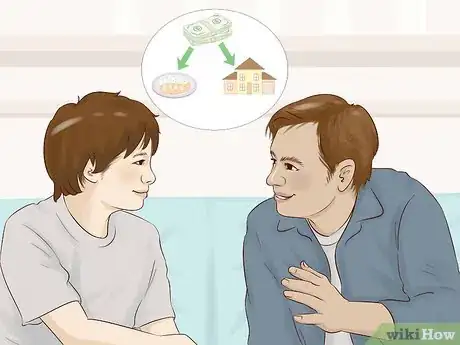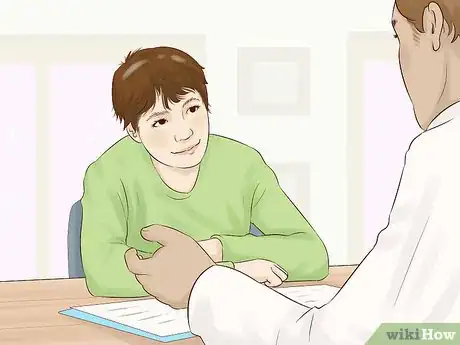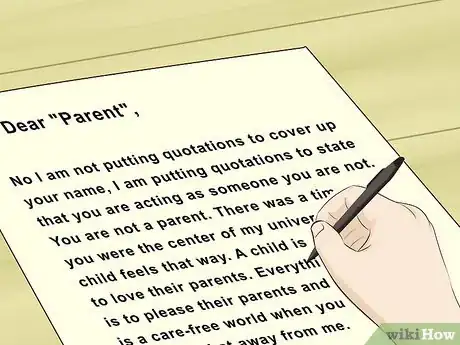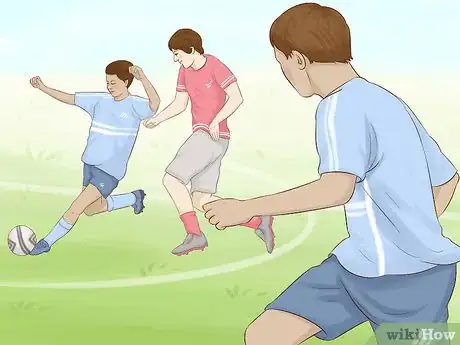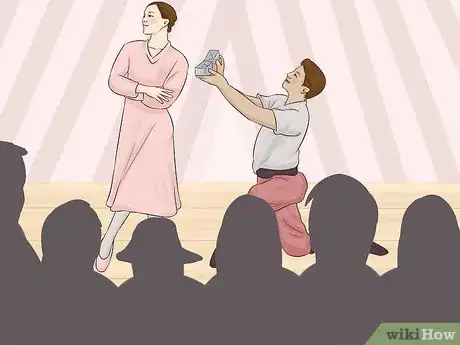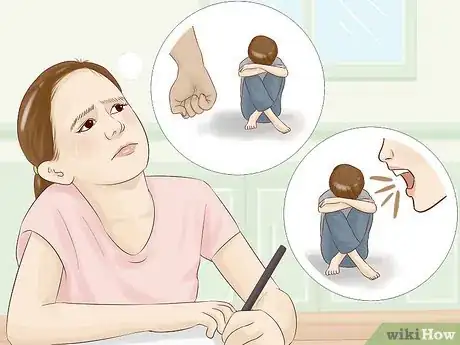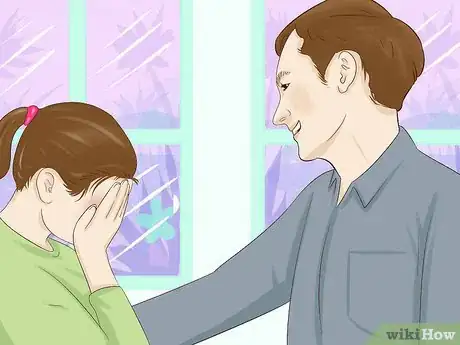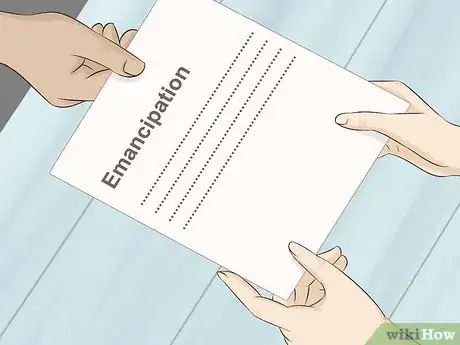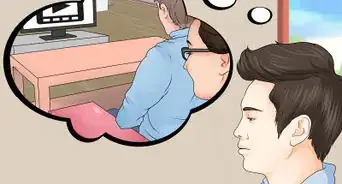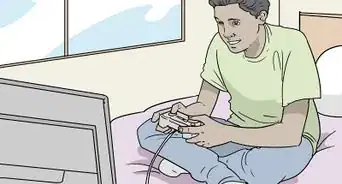This article was co-authored by Trudi Griffin, LPC, MS. Trudi Griffin is a Licensed Professional Counselor in Wisconsin specializing in Addictions and Mental Health. She provides therapy to people who struggle with addictions, mental health, and trauma in community health settings and private practice. She received her MS in Clinical Mental Health Counseling from Marquette University in 2011.
There are 8 references cited in this article, which can be found at the bottom of the page.
This article has been viewed 149,418 times.
Dealing with a “bad parent” can mean a lot of different things. If you and your parent are not getting along, if they are very strict, or if they are not very responsible, you might consider your parent a bad one. In these scenarios, you can find ways to cope with your “bad parent” or simply spend less time at home. If your parent is abusive, however, you may need to take some legal action to remove yourself from the situation.
Steps
Finding Ways to Cope
-
1Daydream about the future. Daydreaming sometimes gets a bad rap, but there are many benefits to daydreaming. Daydreaming is associated with increased creativity, enhanced memory, empathy, and improved mood. Plus, it’s easy, it doesn’t cost anything, and it’s a wonderful way to cope with your problems at home.[1]
-
2Make a long-term plan. You may not be able to pack up and leave tomorrow, but eventually it will be time to go. Heading out on your own requires a great deal of planning, so begin formulating your strategy now. How do you plan to save up enough money to survive? Where do you want to go? Will you head off to school, to the military, or simply to a new city? Form a plan by talking to people who are older than you, speaking with a guidance counselor at school, and/or doing some research on your own. Then, set your plan into motion.Advertisement
-
3Express yourself creatively. Anytime you have negative emotions or a bad situation to deal with, one excellent way to cope is to express yourself creatively. This might be writing in a journal, drawing a picture, or writing a song. This is a great way to process your emotions, and help you cope with your bad parent.[2]
-
4Talk to a therapist. Sometimes you may need someone to talk to who has no connection to the situation at hand, and who you can trust 100%. A good choice for this is a therapist. A good therapist can help you sort through your problems at home and find a way to deal with them.[3]
- If you do not want to approach your parent about helping you find a therapist or if your parent has said no, then you can also talk to the guidance counselor at your school for help.
- If your parent says no based on financial reasons, then it might be helpful to let your parent know that some therapists offer a sliding scale for patients who cannot afford the regular fees. You may be able to pay as little as $10 per session.
- A therapist may also be able to help you and your parent develop a better relationship. If you think that your parent might be open to therapy, then try saying something like, "I would like our relationship to improve, but I think we might need some help. I am willing to do some therapy with you so that we could work on that. Is that something you would be willing to do too?"
-
5Write your parent a letter. Many issues between family members can be solved through communication. When we communicate face-to-face, however, things can get heated, and it can be very difficult to get across what you want to say. If you feel that you may be able to sort out the issues you have with your parent, think about writing them a letter.
- Even if you have no intention of giving them the letter, taking the time to write it can be an excellent way to process what you’re feeling. Then, simply throw it away.
Spending Less Time at Home
-
1Join a sports team. If you enjoy physical activity or would like a reason to exercise, a sports team is an excellent way to get out the house. Furthermore, team sports encourage teamwork, discipline, and cooperation. If you excel at sports, you may even be able to earn a scholarship.
-
2Audition for a play. If sports are not your thing, auditioning for a play or joining the drama club may be a good fit. If you have an outgoing personality, a part in the school play may be perfect for you. If you don’t see yourself onstage, there are also many behind-the-scenes roles (like stage crew or lighting design) that you might enjoy.
-
3Find an after school job. If school really isn’t your thing, you probably aren’t going to want to spend more time there. Another option for getting out of the house is to secure some part-time employment. An after school job is wonderful for teaching you punctuality, responsibility, and time-management. Best of all, it can put some money in your pocket, which you can save up to enable you to move out when you become old enough.[4]
-
4Hang out with friends. Maybe your life is stressful enough and you don’t want to create more work or take on additional responsibilities. That’s OK! Simply spend more time outside of the house hanging out with your friends. Go see a concert, visit a museum, or take a walk around the park. Time with friends can reduce stress and boost your mood while getting you out of the house.[5]
-
5Visit other family members. Another healthy way to spend time outside of your house is to visit your other family members. Do you have grandparents, cousins, or older siblings that live near-by? Take some time to go and visit them. You may want to discuss your problems with them, or maybe not. In any case, spending time with family is sure to lift your mood and help you cope.[6]
Taking Serious Action
-
1Identify abuse. Federal legislation defines child abuse as “Any recent act or failure to act on the part of a parent or caretaker which results in death, serious physical or emotional harm, sexual abuse or exploitation"; or “An act or failure to act which presents an imminent risk of serious harm." Take some time to consider whether you and your parents are simply have a rough patch, or if you experiencing abuse.[7]
-
2Talk to someone. The first step in taking serious action against this abuse is to gain the support of a trusted adult. This might be a teacher at school, your guidance counselor, your therapist, the parent of a close friend, or another relative. Explain to them everything that has happened to you, and ask for their help in stopping the abuse.
-
3Submit a report. The adult who is helping you should contact Child Protective Services (CPS). Sit down with your adult helper and generate a list of any and all abuse you have experienced. Include as many specifics (details and dates) as you can. Then find your local CPS office and have your adult go in person (with your list) to submit the report.
-
4Consider a change in custody. Do you have another parent or grandparent who could gain custody of you? You may want to talk to them about taking your abusive parent to court. This requires a visit to a lawyer who can assist your parent or grandparent with filing the appropriate paperwork.[8]
- Be aware that this can take a long time, and you may need to be in contact with your abusive parent during this time.
- These laws vary from state to state, but in most cases the count will strongly consider the opinions of the child.
-
5Emancipate yourself. If you are a teenager and you are supporting yourself financially, you may want to consider legally emancipating yourself. This involves filing a petition for emancipation (at your local Circuit Court), paying a fee ($150-200), and attending a court hearing.[9]
- Before you pursue emancipation, you must be employed, and you must secure a place to live outside of your parents home (and be able to prove this to the court).
- Depending on your district, filing for emancipation can usually be done without a lawyer.
- The emancipation process is much smoother if your parents agree.
References
- ↑ http://dailyhealthpost.com/5-surprising-health-benefits-of-daydreaming/
- ↑ http://paidtoexist.com/three-ways-to-deal-with-emotions/
- ↑ http://www.huffingtonpost.com/2015/08/11/8-signs-you-should-see-a_n_4718245.html
- ↑ http://www.education.com/magazine/article/after-school-jobs/
- ↑ http://www.huffingtonpost.com/2012/12/22/health-benefits-friends-family_n_2317696.html
- ↑ http://www.huffingtonpost.com/2012/12/22/health-benefits-friends-family_n_2317696.html
- ↑ https://www.childwelfare.gov/topics/can/defining/federal/
- ↑ https://www.rosen.com/childcustody/carticles/child-custody-when-do-children-get-to-decide/
- ↑ http://ctlawhelp.org/a-teenagers-guide-to-emancipation#

